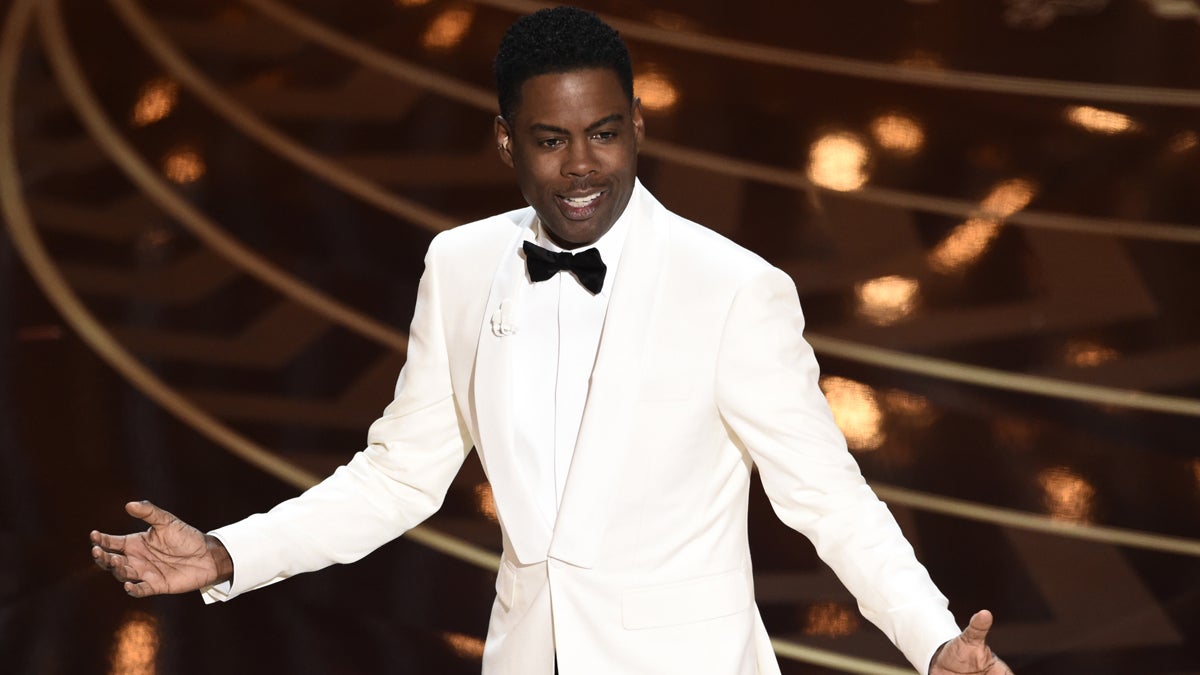Black journalists gather to imagine dismantling #OscarsSoWhite

Host Chris Rock speaks at the Oscars on Sunday
To focus on the recent controversy surrounding #OscarsSoWhite, the Philadelphia Association of Black Journalists, in conjunction with the Temple University Association of Black Journalists, hosted its eighth annual Monitoring Hollywood discussion last week, “#OscarsSoWhite: How can Black artists, writers and producers fix Hollywood’s diversity problem.”
Writer and activist April Reign’s hashtag heard ’round the world, #OscarsSoWhite, has sparked a deeper level of discussion and debate on Hollywood’s age-old lack of diversity — in front of and behind the camera. This year, the discussion has evolved, and throngs of entertainment insiders were asked to weigh in on the Oscars boycott debate. Were you Team Jada (boycott) or Team Aunt Viv (watch/attend)?
To focus on the recent controversy surrounding #OscarsSoWhite, the Philadelphia Association of Black Journalists, in conjunction with the Temple University Association of Black Journalists, hosted its eighth annual Monitoring Hollywood discussion last week, “#OscarsSoWhite: How can Black artists, writers and producers fix Hollywood’s diversity problem.”
The PABJ Media Monitoring Committee, co-chaired by national columnist and G Philly editor Ernest Owens and Emmy Award-winning journalist Denise Clay, assembled a dynamic panel of entertainment experts with Philadelphia ties. Notable entertainment journalist Patrick Riley of “The Oprah Winfrey Show” moderated a discussion with Owens; Tiffany Bacon, actress and 100.3 The Beat host; Mister Mann Frisby, author and former Daily News/Inquirer reporter; and Jos Duncan, filmmaker and associate professor at Temple University.
Panelists fielded questions from the moderator and from the intergenerational audience of students, media professionals, and community members.
Are you angry or hopeful?
The panelists said they were hopeful. Some were both angry and hopeful at the same time.
Are social media and digital changing the game?
The panelists were in agreement: Yes. The accessibility and the opportunity to create, market, and distribute content allows more people to get into the game.
Will boycotts hurt or help the fight for diversity in film?
The sentiment was that it wouldn’t hurt. Frisby mentioned that African-Americans purchase a majority of the movie tickets yet still have no influence on the types of films that are made.
How do we support black artists?
Other questions that made for a lively discussion included: What about supporting the films that are out there? Could this activism be better channeled at promoting more black creators in the industry rather than only speaking of a lack thereof?
Suggestions from the panel: Just say “No!” to bootleg copies of movies. Go to theatre, double check your ticket stub, support the filmmakers. The panelists briefly got into the never-ending why do African Americans support Tyler Perry productions debate. Participants also took a critical look at African-American Hollywood A-listers.
Getting a leg up on the future
The conversation didn’t dwell on the past or present perceived ills of Hollywood, though. Instead it moved the conversation forward to examine how to positively affect the future. They encouraged us to think creatively about how to remain relevant to the industry, and to stay open to reinventing our careers, to stay motivated, and to seek mentors at all stages of our careers.
Panelists discussed the need for people of color in positions of influence to find and cultivate the next generation, and to reach back to help someone else move up, as important areas of focus. Some Hollywood A-listers of color were called out for not employing more African-Americans and other minorities in key positions, such as writers, on their productions.
Activist and filmmaker Nate Parker was cited as a strong example to emulate in Hollywood. His latest production, “The Birth of a Nation,” as well as Idris Elba‘s “Beasts of No Nation,” were noted as films the African-American community should have supported. The current wave of activism on #BlackTwitter and other social media should have been used to promote the two Oscar snubs.
“The biggest takeaway for me was that we as panelists were truly able to be insightful and helpful to the students and attendees of the event,” said Bacon. “The conversation was deeper than just the diversity issues in Hollywood. It became a conversation of how to stay focused and continue to fight for your dream, even when things like lack of diversity and family members who don’t understand what you’re doing become a source of discouragement.”
Insights from the panelists included advice on volunteering versus requiring payment for services. They were in agreement that no labor is free — there’s always a cost. Yet Owens was adamant that no amount of money, no job, is worth your sanity. Then it got heated, moderator Riley jumped in. He stressed that “you have to take an accounting.” He told the story of his decision to accept a job at Harpo Studios. Her said he had a moment’s notice to assess the offer, and against the advice of others, he took the risk, and it was one of the best professional decisions he’s ever made.
Owens said the event was well done. “We were able to unpack so many layers with the issues, in many ways taking it beyond the A-list Hollywood. We took it locally — we talked about the local Black Film Festival, Reel Black, and other local venues.”
As with Bacon, an important aspect of the event for Owens was that the media, enthusiasts, and students were able to connect. “There was a sense of camaraderie among the young people and those who have been in the industry for a while. We were able to connect people who otherwise may not have had an opportunity to do so,” he said. “It was a great way of having a serious conversation and walking out with a sense of empowerment,” said Owens.
—
Germaine Edwards, Ph.D., is an education and public relations consultant.
WHYY is your source for fact-based, in-depth journalism and information. As a nonprofit organization, we rely on financial support from readers like you. Please give today.

